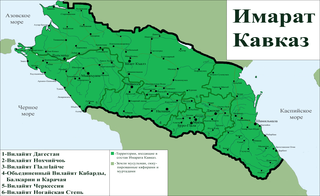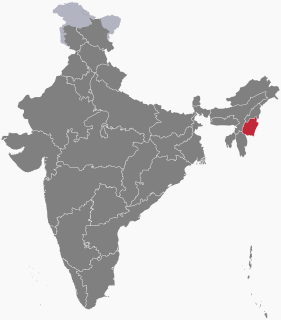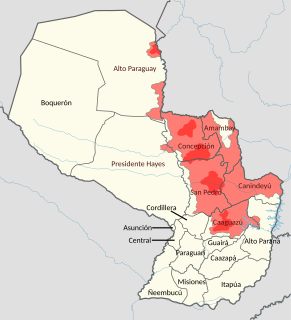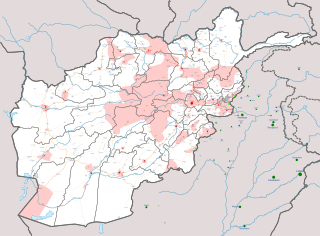 W
WThe Allied Democratic Forces insurgency is an ongoing conflict waged by the Allied Democratic Forces in Uganda and the Democratic Republic of the Congo, against the governments of those two countries. The insurgency began in 1995, intensifying in 2013, resulting in hundreds of deaths. The ADF is known to currently control a number of hidden camps which are home to about 2,000 people; in these camps, the ADF operates as proto-state with "an internal security service, a prison, health clinics, and an orphanage" as well as schools for boys and girls.
 W
WThe Angolan Civil War was a civil war in Angola, beginning in 1975 and continuing, with interludes, until 2002. The war began immediately after Angola became independent from Portugal in November 1975. The war was a power struggle between two former anti-colonial guerrilla movements, the communist People's Movement for the Liberation of Angola (MPLA) and the anti-communist National Union for the Total Independence of Angola (UNITA). The war was used as a surrogate battleground for the Cold War by rival states such as the Soviet Union, Cuba, South Africa and the United States.
 W
WThe War in Darfur, also nicknamed the Land Cruiser War, is a major armed conflict in the Darfur region of Sudan that began in February 2003 when the Sudan Liberation Movement (SLM) and the Justice and Equality Movement (JEM) rebel groups began fighting the government of Sudan, which they accused of oppressing Darfur's non-Arab population. The government responded to attacks by carrying out a campaign of ethnic cleansing against Darfur's non-Arabs. This resulted in the death of hundreds of thousands of civilians and the indictment of Sudan's president, Omar al-Bashir, for genocide, war crimes, and crimes against humanity by the International Criminal Court.
 W
WThe Eritrean–Ethiopian border conflict was a violent standoff and a proxy conflict between Eritrea and Ethiopia. It consisted of a series of incidents along the then-disputed border; including the Eritrean–Ethiopian War of 1998–2000 and the subsequent Second Afar insurgency. The border conflict was a continuation of the Eritrean–Ethiopian War of 1998–2000. It included multiple clashes with numerous casualties, including the Battle of Tsorona in 2016. Ethiopia stated in 2018 that it would cede Badme to Eritrea. This led to the Eritrea–Ethiopia summit on 9 July 2018, where an agreement was signed which demarcated the border and agreed a resumption of diplomatic relations.
 W
WThe Houthi insurgency in Yemen, also known as the Houthi rebellion, Sa'dah War, or Sa'dah conflict, was a military rebellion pitting Zaidi Shia Houthis against the Yemeni military that began in Northern Yemen and has since escalated into a full-scale civil war. The conflict was sparked in 2004 by the government's attempt to arrest Hussein Badreddin al-Houthi, a Zaidi religious leader of the Houthis and a former parliamentarian on whose head the government had placed a $55,000 bounty. Initially, most of the fighting took place in Sa'dah Governorate in northwestern Yemen, but some of the fighting spread to neighbouring governorates Hajjah, 'Amran, al-Jawf and the Saudi province of Jizan. After the Houthi takeover of the capital city Sana'a in late 2014, the insurgency became a full-blown civil war with a major Saudi-led intervention in Yemen beginning in March 2015.
 W
WThe War in Ingushetia began in 2007 as an escalation of an insurgency in Ingushetia connected to the separatist conflict in Chechnya. The conflict has been described as a civil war by local human rights activists and opposition politicians; others have referred to it as an uprising. By mid-2009 Ingushetia had surpassed Chechnya as the most violent of the North Caucasus republics. However, by 2015 the insurgency in the Republic had greatly weakened, and the casualty toll declined substantially in the intervening years.
 W
WThe insurgency in Khyber Pakhtunkhwa, also known as the War in North-West Pakistan, is an armed conflict involving Pakistan, and armed militant groups such as the Tehrik-i-Taliban Pakistan (TTP), Jundallah, Lashkar-e-Islam (LeI), TNSM, al-Qaeda, and their Central Asian allies such as the ISIL–Khorasan (ISIL), Islamic Movement of Uzbekistan, East Turkistan Movement, Emirate of Caucasus, and elements of organized crime.
 W
WThe Insurgency in Manipur is an ongoing armed conflict between India and a number of separatist rebel groups, taking place in the region of Manipur. The Insurgency in Manipur is part of the wider Insurgency in Northeast India; it combines elements of a national liberation war as well as an ethnic conflict.
 W
WThe Insurgency in Meghalaya is a frozen armed conflict between India and a number of separatist rebel groups which was taking place in the state of Meghalaya. The Insurgency in Meghalaya is part of the wider Insurgency in Northeast India, and was fueled by demands of the Khasi, Synteng and Garo people for a separate state.
 W
WThe Insurgency in Paraguay, also known as the Paraguayan People’s Army insurgency and the EPP rebellion, is an ongoing low-level armed conflict in northeastern Paraguay. Between 2005 and the summer of 2014, the ongoing EPP campaign has resulted in at least 50 deaths in total, the majority of them being local ranchers, private security guards and police officers, along with several insurgents. During that same period the group perpetrated 28 kidnappings for ransom and a total of 85 "violent acts".
 W
WThe insurgency in the North Caucasus was a low-level armed conflict between Russia and militants associated with the Caucasus Emirate and, since June 2015, Islamic State of Iraq and the Levant (ISIL) groups. It followed the official end of the decade-long Second Chechen War on 16 April 2009. It attracted people from the Middle East, North Africa, Europe, and Central Asia, who then participated in the conflict, but volunteers from the North Caucasus are also fighting in Syria. Also used is the name Armed Conflict in the North Caucasus.
 W
WThe Iran–PJAK conflict is an armed conflict between the Islamic Republic of Iran and Kurdish rebels of the Kurdistan Free Life Party (PJAK), which began in 2004 and largely ended in 2011. The group carried out numerous attacks in the Kurdistan Province of Iran and provinces of Western Iran. PJAK is closely affiliated with the militant Kurdistan Workers' Party (PKK), the primary opponent of the Republic of Turkey in the Kurdish–Turkish conflict. PJAK has been designated as a terrorist organization by Iran, Japan, Turkey, and the United States.
 W
WThe Iraq War was a protracted armed conflict that began in 2003 with the invasion of Iraq by a United States-led coalition that overthrew the government of Saddam Hussein. The conflict continued for much of the next decade as an insurgency emerged to oppose the occupying forces and the post-invasion Iraqi government. An estimated 151,000 to 1,033,000 Iraqis were killed in the first three to four years of conflict. US troops were officially withdrawn in 2011. However, following the spread of the Syrian Civil War and the territorial gains of the Islamic State of Iraq and the Levant (ISIL), the Obama administration decided to redeploy US forces to Iraq in 2014. Many former soldiers are employed by defense contractors and private military companies. The U.S. became re-involved in 2014 at the head of a new coalition; the insurgency and many dimensions of the civil armed conflict continue. The invasion occurred as part of the George W. Bush administration's War on Terror, following the September 11 attacks.
 W
WThe Iraqi conflict is a long-running armed conflict that began with the 2003 invasion of Iraq by a United States-led coalition that toppled the government of Saddam Hussein. The conflict continued as an insurgency emerged to oppose the occupying forces and the post-invasion Iraqi government. The United States officially withdrew from the country in 2011, but became re-involved in 2014 at the head of a new coalition. The conflict is still ongoing as a low-level insurgency.
 W
WAn insurgency began in Iraq after the 2003 US-led invasion, and lasted throughout the ensuing Iraq War which lasted from 2003 until 2011. The first phase of the insurgency began shortly after the 2003 invasion and prior to the establishment of the new Iraqi government. From around 2004 to May 2007, the insurgency primarily targeted the Multi-National Force – Iraq, while latterly Iraqi security forces, seen by Iraqi insurgents as collaborators with the coalition, were also targeted.
 W
WThe Insurgency in the Maghreb refers to the Islamist insurgency in the Maghreb and Sahel regions of North Africa that followed on from the Algerian Civil War. The Algerian militant group Salafist Group for Preaching and Combat (GSPC) allied itself with al-Qaeda to eventually become al-Qaeda in the Islamic Maghreb (AQIM). The Algerian and other Maghreb governments fighting the militants have worked with the United States and the United Kingdom since 2007, when Operation Enduring Freedom – Trans Sahara began. While the 2011 Arab Spring affected support for the insurgency, it also presented military opportunities for the jihadists. In 2012, AQIM and Islamist allies captured the northern half of Mali, until being fought back less than a year later following a French-led foreign intervention, which was succeeded by the Sahel-wide Operation Barkhane. In Libya, the Islamic State of Iraq and the Levant (ISIL) has been able to control some limited territory in the ongoing civil war since 2014, amid allegations of local collaboration between the rival AQIM and ISIL.
 W
WThe Nagorno-Karabakh conflict is an ethnic and territorial conflict between Armenia and Azerbaijan over the disputed region of Nagorno-Karabakh, inhabited mostly by ethnic Armenians, and seven surrounding districts, inhabited mostly by Azerbaijanis until their expulsion during the First Nagorno-Karabakh War, which are de facto controlled by the self-declared Republic of Artsakh, but are internationally recognized as de jure part of Azerbaijan. The conflict has its origins in the early 20th century, though the present conflict began in 1988, when the Karabakh Armenians demanded that Karabakh be transferred from Soviet Azerbaijan to Soviet Armenia. The conflict escalated into a full-scale war in the early 1990s.
 W
WThe Papua conflict is an ongoing conflict in Western New Guinea between Indonesia and the Free Papua Movement. Subsequent to the withdrawal of the Dutch administration from the Netherlands New Guinea in 1962 and implementation of Indonesian administration in 1963, the Free Papua Movement has conducted a low-intensity guerrilla war against Indonesia through the targeting of its military and police.
 W
WThe Qatar–Saudi Arabia diplomatic conflict, sometimes referred to as the Second Arab Cold War, is the ongoing struggle for regional influence between Qatar and Saudi Arabia (KSA), both of which are members of the Gulf Cooperation Council (GCC). Qatar–Saudi Arabia relations have been especially strained since the beginning of the Arab Spring, that left a power vacuum both states sought to fill, with Qatar being supportive of the revolutionary wave and Saudi Arabia opposing it. Both states are allies of the United States, and have avoided direct conflict with one another.
 W
WThe Sistan and Baluchestan insurgency, part of the Balochistan conflict, began approximately in 2004 and is an ongoing low-intensity asymmetric conflict in Sistan and Baluchestan Province between Iran and several Baloch Sunni militant organizations which are designated as terrorist organizations by Iran.
 W
WThe Somali Civil War is an ongoing civil war taking place in Somalia. It grew out of resistance to the military junta led by Siad Barre during the 1980s. By 1988–1990, the Somali Armed Forces began engaging various armed rebel groups, including the Somali Salvation Democratic Front in the northeast, the Somali National Movement in the northwest, and the United Somali Congress in the south. The clan-based armed opposition groups overthrew the Barre government in 1991.
 W
WThe Somalia War, also known as the Ethiopian invasion and occupation of Somalia, was an armed conflict involving Ethiopian (ENDF) and Transitional Federal Government forces and Somali troops from Puntland against the Islamic Court Union, and militias affiliated to them for control of the Somalia.
 W
WThe 2009–present phase of the Somali Civil War is concentrated in southern and central Somalia and portions of north eastern Kenya. It began in early February 2009 with the conflict between the forces of the Federal Government of Somalia, assisted by African Union peacekeeping troops, and various militant groups and factions. The violence has displaced thousands of people in the southern part of the country. The conflict has also seen fighting between the Sufi Ahlu Sunna Waljama'a and Al-Shabaab.
 W
WThe South Thailand insurgency is an ongoing conflict centered in southern Thailand. It originated in 1948 as an ethnic and religious separatist insurgency in the historical Malay Patani Region, made up of the three southernmost provinces of Thailand and parts of a fourth, but has become more complex and increasingly violent since the early 2000s from drug cartels, oil smuggling networks, and sometimes pirate raids.
 W
WThe Taliban insurgency began after the group's fall from power during the 2001 War in Afghanistan. The Taliban forces are fighting against the Afghan government, formerly led by President Hamid Karzai, now led by President Ashraf Ghani, and against the US-led International Security Assistance Force (ISAF). The insurgency has spread to some degree over the Durand Line border to neighboring Pakistan, in particular the Waziristan region and Khyber Pakhtunkhwa. The Taliban conduct low-intensity warfare against Afghan National Security Forces and their NATO allies, as well as against civilian targets. Regional countries, particularly Pakistan, Iran, China and Russia, are often accused of funding and supporting the insurgent groups.
 W
WThe War in Afghanistan stems from the United States invasion of Afghanistan on the 7 October 2001, when the United States of America and its allies successfully drove the Taliban from power in order to deny Al-Qaeda a safe base of operations in Afghanistan. Since the initial objectives were completed, a coalition of over 40 countries formed a security mission in the country called International Security Assistance Force, of which certain members were involved in military combat allied with Afghanistan's government. The war has afterwards mostly consisted of Taliban insurgents fighting against the Afghan Armed Forces and allied forces; the majority of ISAF/RS soldiers and personnel are American. The war is code named by the U.S. as Operation Enduring Freedom (2001–14) and Operation Freedom's Sentinel (2015–present); it is the longest war in U.S. history.
 W
WThe War on terror, also known as the Global War on Terrorism and U.S. War on Terror, is an international military campaign launched by the United States government after the September 11 attacks. The targets of the campaign are primarily Sunni Islamic fundamentalist armed groups located throughout the Muslim world, with the most prominent groups being Al-Qaeda, the Islamic State, the Taliban, Tehrik-i-Taliban Pakistan, and the various franchise groups of the former two organizations. The naming of the campaign uses a metaphor of war to refer to a variety of actions that do not constitute a specific war as traditionally defined. U.S. president George W. Bush first used the term "war on terrorism" on 16 September 2001, and then "war on terror" a few days later in a formal speech to Congress. In the latter speech, George Bush stated, "Our enemy is a radical network of terrorists and every government that supports them." The term was originally used with a particular focus on countries associated with al-Qaeda. The term was immediately criticised by such people as Richard B. Myers, chairman of the Joint Chiefs of Staff, and more nuanced terms subsequently came to be used by the Bush administration to publicly define the international campaign led by the U.S. While it was never used as a formal designation of U.S. operations in internal government documentation, a Global War on Terrorism Service Medal was issued.